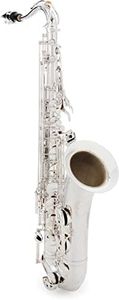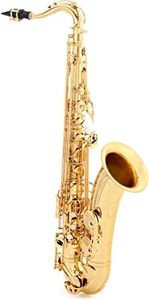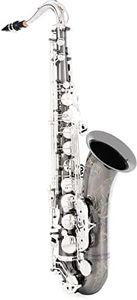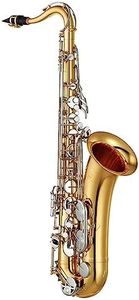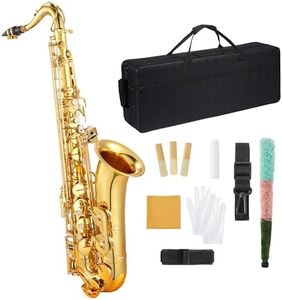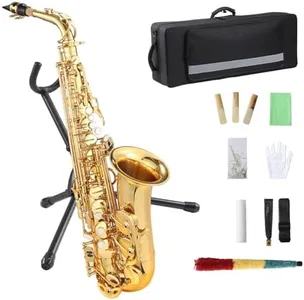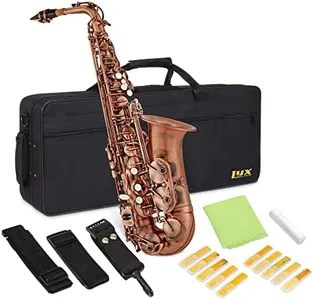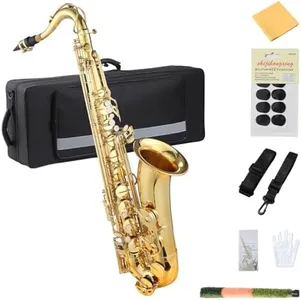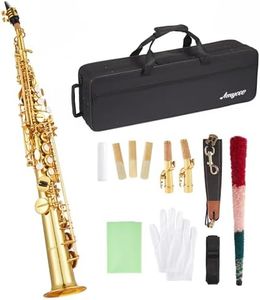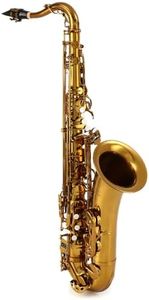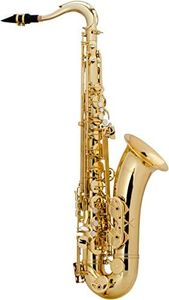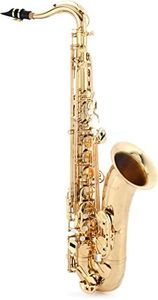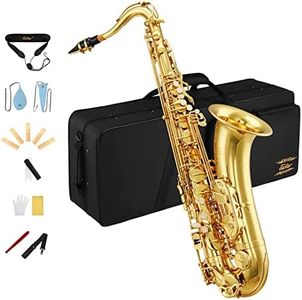10 Best Tenor Saxophones 2026 in the United States
Our technology thoroughly searches through the online shopping world, reviewing hundreds of sites. We then process and analyze this information, updating in real-time to bring you the latest top-rated products. This way, you always get the best and most current options available.

Our Top Picks
Winner
Yamaha YTS-62 III Professional Tenor Saxophone - Silver-plated
The Yamaha YTS-62 III is a professional-grade tenor saxophone crafted primarily from brass with a beautiful silver-plated finish, giving it a classic look and durable surface. Yamaha is well-known for its reliable and quality instruments, making this model a popular choice among serious players. This saxophone features the 62-style neck, which is designed to offer smooth airflow and a rich tone, helping musicians achieve a warm and expressive sound.
The integrated key posts improve the instrument's stability and response, making the key mechanism feel precise and comfortable to play. Weighing about 23.4 pounds with its case, it’s a bit on the heavier side, which might affect comfort during long playing sessions, but the ergonomics remain well thought out for professional use. The included professional neck receiver enhances the fit and overall feel when assembling the saxophone.
This saxophone suits intermediate to advanced players who want a dependable, expressive instrument for performance or studio work. While the price and slight weight might be considerations, its build quality and brand reputation make it a solid choice for those seeking a serious tenor saxophone that balances sound quality and playability.
Yamaha YTS-62 III Professional Tenor Saxophone - Gold Lacquer with 2-piece Bell
The Yamaha YTS-62 III Professional Tenor Saxophone is designed for serious musicians and offers some impressive features. One of its standout strengths is its professional neck receiver, which enhances the instrument's playability and sound quality. The integrated key posts contribute to its durability and tuning stability, making it a reliable choice for performances. Its construction from high-quality materials, paired with a gold lacquer finish, not only provides an elegant look but also contributes to a warm and rich tone, essential for tenor saxophonists.
The bore size and 62-style neck design are tailored for great intonation and responsiveness across different registers, catering well to both advanced players and professionals. Weighing in at 20 pounds, it is relatively manageable for a tenor saxophone, although it may still feel heavy during extended playing sessions.
This instrument might be on the pricier side, which could be a drawback for beginners or casual players who are not ready to invest heavily. The complexity of the key mechanism might require some time for less experienced players to get accustomed to, potentially making it less appealing for those just starting out.
P. Mauriat PMXT-66RDK Tenor Sax, Dark, Rolled Tone Hole with Case
Most important from
3 reviews
The P. Mauriat PMXT-66RDK Tenor Saxophone stands out with its high-quality brass material and dark lacquer finish, which not only provide a visually appealing appearance but also contribute to the instrument's durability and rich sound.
The saxophone features rolled tone holes, which are known for enhancing the instrument's tonal quality and making it easier to play. This model is designed in the key of F Sharp, catering to advanced players who appreciate precision and performance in their instruments. The ProTec case included with the saxophone ensures that it is well-protected during transport, adding to its practicality for musicians on the go.
However, this tenor saxophone is on the heavier side at 20.8 pounds, which might be a consideration for some users when it comes to ergonomics and ease of handling during long practice sessions or performances. The P. Mauriat brand is well-regarded in the saxophone community, known for producing high-quality instruments. This saxophone is a solid choice for advanced players seeking an instrument with excellent sound quality and a professional build, though beginners might find it a bit challenging due to its weight and advanced key mechanism.
